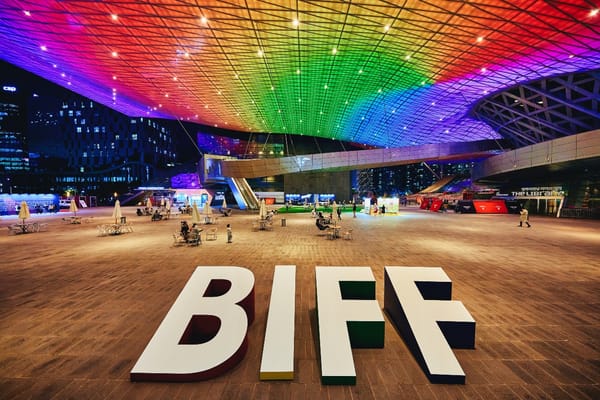How Much Can Netflix Grow In Asia Pacific?; Arab Titles Join Cannes Line-up; South Indian Cinema Strikes Again

Another busy week with Netflix’s shock news of declining subs, more Cannes announcements, the Warner Bros Discovery international restructure and another big global hit from India. Next week, Streamlined will be reporting from the Far East Film Festival in Udine, Italy, which is shaping up to be one of the first physical interactions between the film industries of Asia and Europe for some time.
1. How much can Netflix grow in Asia Pacific?
The Asia Pacific region was one of the few bright spots for Netflix this week, with its surprising news of a net loss of 200,000 subscribers in the first quarter, which sent its share price plunging by 35% and major investors like Pershing Square Capital heading for the door. This was the streamer’s first decline in subscriber numbers in more than a decade and may be followed by the loss of an additional two million subs in the second quarter.
Asia Pacific, on the other hand, added 1.09 million subs for a total 33.72 million members with “nice growth” in Japan, India, Philippines, Thailand and Taiwan. With its huge populations, young demographics and increasing mobile penetration, Asia arguably represents the biggest growth opportunity globally for Netflix, as subscriptions stagnate (and price hikes turn off consumers) in more mature markets in North America and Europe.
And yet the "headwinds" that Netflix cited as reasons for the downturn – slower than expected broadband adoption, competition from rival streamers, password sharing, and macro events such as inflation – all apply equally across Asia and the region has some other headwinds all of its own.
If you look at Asian markets purely in terms of population, Netflix (along with other foreign streamers) isn’t allowed into the biggest market, China; struggles to compete against Disney+ Hotstar in the second biggest, India; and had a slow start in the third biggest, Indonesia, where it was blocked until 2020 by leading telco Telkom Indonesia for carrying “inappropriate” content.
Disney+ got a head start in India simply by acquiring the market’s biggest player, Hotstar, as part of its acquisition of 21st Century Fox, which also gave it insights into operating in markets with a much lower average revenue per user (ARPU) than in the West. That knowledge has also helped Disney+ Hotstar to become one of the biggest players in Indonesia in a very short space of time. Disney+ Hotstar, and increasingly Amazon Prime Video, also carry sports, including cricket, which in markets like India is huge.
Then there are the smaller but more mature territories with higher ARPU, most notably Korea and Japan, which both have strong, well-financed domestic broadcasters that won’t give up their markets without a fight. Korea’s CJ ENM currently produces content for Netflix but has global streaming ambitions of its own. English-language markets like Australia and New Zealand have been more of slam dunk for Netflix, but the spectre of local quotas and other forms of pushback are on the horizon and anyway both markets will reach saturation quickly as in population terms they are relatively small.
On the content side, the outsized success of Squid Game overshadows the fact that Netflix hasn’t exactly set the world on fire outside of K-drama and Japanese anime. Although it had a few Indian hits a few years back (Sacred Games, Delhi Crime) these days there’s often more buzz around Hindi-language shows from Amazon Prime Video and Disney+ Hotstar, while India’s local broadcasters are catching up fast in original content and have more depth in regional languages.
As it can’t operate in China, Netflix hasn’t really focused on Chinese originals, apart from a few Taiwanese series, most recently Light The Night and The Victims Game, which are decent but probably not moving the dial on sign-ups outside of Taiwan. In Southeast Asia, Netflix appears to be more focused on acquisitions than originals, and again competes with local streamers and broadcasters that have a much deeper understanding of local audiences.
To be fair, one issue Netflix faces is that the infrastructure is not there in Asia to produce huge quantities of high-end drama that could travel internationally. Before the rise of the streamers, local TV industries focused on long-running soaps and low-budget period dramas. Each of the major content-producing territories might be able to squeeze out a few six-part award winners each year, but now the talent can also pitch those ideas to HBO, Disney, Apple, Paramount and CJ ENM.
Meanwhile, the cheaper content that keeps local streamers and broadcasters humming – youth drama, slapstick comedy, romances and horror – often don’t work outside of their home territories. There’s a huge disconnect between the talent and the bigger platforms (not just Netflix) whose boots on the ground hail from the local broadcasters and understandably have no clue how to suddenly transform themselves into Emmy Award-winning teams.

Netflix’s pivot towards advertising could potentially work well in price-sensitive Asia – Hong Kong-based regional streamer Viu has been able to grow rapidly across Southeast Asia with its freemium model, offering tiers at different price points with or without ads. This strategy has also worked for Chinese streamers Tencent, Youku and iQiyi. AVOD is still huge and growing across much of India and Southeast Asia.
But everywhere that Netflix goes in Asia, success depends on relationships with local telcos, broadband providers, marketers, advertising agencies and digital payment platforms and many of these are already deeply embedded with the streamer’s competitors. Other strategic changes, such as moving into video games, might also draw subscribers in Asia, but will be expensive and pits Netflix against gaming giants in China and Japan.
As the restructured US media giants start rolling out their streaming services globally, it has highlighted how Netflix’s strategy of being all things to everyone might not actually work. Asian consumers are quickly grasping the fact that Disney+ is fantastic for franchises and kids content; HBO and Apple are the home of quality, upscale content; Viu supplies your cheap K-drama fix and iQiyi is good for Chinese dramas and reality shows. What does Netflix stand for in Asia? Ironically, it has made Korean and Japanese content hugely popular in the West, but back in Asia is up against massive competition without an identifiable niche.
2. Cannes completes line-up; parallel sections announced
Arab cinema had appeared strangely absent when Cannes announced its official selection last week, with just one Egyptian title, Tarek Saleh’s Boy From Heaven, in Competition (although the Middle East was represented by titles from Iran and Turkey). That has now been remedied by the addition of three Arabic-language titles to Un Certain Regard (UCR) and three in the parallel Directors Fortnight section.
The three UCR titles include the second feature from Palestinian director Maha Haj, Mediterranean Fever, a black comedy about a depressed writer who asks a neighbour to help him commit suicide. Haj’s debut, Personal Affairs, premiered in UCR in 2016. Also playing in UCR are two titles from north Africa – The Blue Caftan, from Morocco’s Maryam Touzani, whose debut Adam played in UCR in 2019, and Harka, a debut feature from Tunisia’s Lotfy Nathan, about a young man forced to look after his two sisters following their father’s sudden death.
The Arabic titles in Directors Fortnight include two debut features – The Dam, from Lebanese filmmaker Ali Cherri, and Ashkal, from Tunisia’s Youssef Chebbi – and Under The Fig Trees, the first narrative feature from acclaimed Tunisian-French documentary filmmaker Erige Sehiri.
Meanwhile, Critics Week, which focuses on first and second films, included a Korean title in Special Screenings, July Jung’s Next Sohee, which in addition to the four Korean-language titles in Competition means Asia’s leading soft power territory will really be out in force at this year’s Cannes. Jung’s debut feature, A Girl At My Door, played in Un Certain Regard in 2014. Critics Week also selected Iranian filmmaker Ali Behrad’s Imagine, which in addition to films from Saeed Roustaee and Ali Abbasi in Competition, means there are at least three Iranian films at the festival.
Tunisian director Kaouther Ben Hania (Beauty And The Dogs) is heading the Critics Week jury, which also includes Busan International Film Festival chief Huh Moon Yung. Last year, the Grand Prize in Critics Week went to Egyptian filmmaker Omar El Zohairy for Feathers.
There are still no signs of Chinese cinema in Cannes apart from two short films in Critics Week – Tu Lin’s Canker and Huang Shuli’s Will You Look At Me. Another Cannes parallel section, ACID, has programmed Japanese director Juichiro Yamasaki’s third feature Yamabuki, which premiered in the main competition at Rotterdam earlier this year.
3. South Indian cinema strikes again
Another weekend and another monster sized hit from the south of India. Following the huge opening of Telugu-language RRR at the end of March, Kannada-language K.G.F.: Chapter 2 grossed around $70m globally over its opening four-day weekend (April 14-17), which coincided with New Year’s Day for several Indian communities.
Directed by Prashanth Neel and starring Kannada superstar Yash, the film is a sequel to 2018 period action hit, K.G.F.: Chapter 1, about a gangster taking on the ruthless bosses of the Kolar Gold Fields in the Indian state of Karnataka. The sequel is again produced by Hombale Films and has added several names from the Hindi-language film industry – Sanjay Dutt, Raveena Tandon and Prakash Raj – to the cast. Shot mostly in Kannada (the language of the state of Karnataka, of which Bangalore is the capital), the film was also released across India in Hindi, Telugu, Tamil and Malayalam versions.

Meanwhile, RRR, directed by S.S. Rajamouli and starring Ram Charan and N.T. Rama Rao Jr., grossed $65m on its opening three-day weekend (March 25-27) and is estimated to have pulled in around $140m globally to date. Most of that gross is from India, but both RRR and K.G.F.: Chapter 2 are drawing audiences in the US, UK and other India diaspora markets.
Another south Indian title, Tamil-language Beast, directed by Nelson and starring Vijay, also opened last weekend and has grossed an estimated $26m globally. Vijay previously starred in Master, which was released January 2021 when Indian cinemas were operating at 50% seating capacity, and grossed around $27m in India before moving to Amazon Prime. (A few months later, Indian cinemas were shuttered again completely until late summer due to a devastating wave of the Delta variant of Covid-19.)
So where are the big Hindi-language hits now that cinemas have been operating at 100% capacity for some time? A major issue is that many of the biggest Hindi titles are being constantly pushed back, as studios wait for cinema admissions in the north of India to recover, and some of the biggest Bollywood stars don’t have any films in the can. Notably, the upcoming Eid holiday in early May will be the first time in several years that Salman Khan, one of India’s biggest stars, doesn’t have a release.
It may also be the case that there are fewer Hindi films with obvious mass market appeal, as the Mumbai-based industry has been exploring different niches, and a lot of the major talent has been busy working on series for the streamers. At the same time, South Indian cinema is still producing films with the tried-and-tested formula of pumped up heroes and over-the-top villains, in which the good guy beats up the baddie and gets the girl (and sometimes stalks the girl, but hey that is seen as being romantic), while the entire audience is standing up in the stalls shouting and whistling.
These films are not subtle. But they may be the kind of post-pandemic catharsis that the Indian audience needs.
LAB & FUNDING NEWS:
- Malaysia’s National Film Development Corporation (FINAS) is partnering with Korea’s Busan International Film Festival (BIFF) and the Asian Contents & Film Market (ACFM) on its new initiative, Malaysian Development Lab for Fiction Feature Films (mylab), curated by Malaysia-born producer Lorna Tee. Under the partnership, mylab will conduct its final workshop session on-site in Busan following a series of online meetings. Between six to eight projects will be selected for the lab, with the best three in line to receive funding of $4,800 (RM20,000) towards further development. Mylab also revealed the mentors for its first edition, which include Francoise von Roy (Germany), Samantha Horley (UK), Monster Jiminez (Philippines), Marten Rabarts (New Zealand), Raymond Phathanavirangoon (Thailand), Roshanak Behest Nedjad (Germany), Marie Dubas (France), Meiske Taurisia (Indonesia), Bradley Liew (Malaysia/Philippines) and Stefano Centini (Italy/Taiwan). Email info@mylab.com.my for further information.
- Netflix is teaming with Lebanon-based Arab Fund for Arts and Culture (AFAC) on a $250,000 grant for Arab female filmmakers. Five projects have been shortlisted for the grant: The Mother Of All Lies, from Moroccan director-producer Asmae El Moudir in the non-fiction category; three projects from Lebanese producers – From The Other Shore (Diala Kachmar), The Day Vladimir Died (Jana Wehbe) and Manity (Tania Khoury); and My Name Is Clara from Tunisian director-producer Sarra Abidi. Netflix said in a statement: “All the women receiving support share a common urge to tell stories that haven’t been told before and tackle subjects often considered unconventional for women.”
IN DEVELOPMENT:
- Indian megastar Shah Rukh Khan is teaming with Rajkumar Hirani (PK, Sanju) on a new romantic comedy, Dunki, which is scheduled for release on December 22, 2023. Also starring Taapsee Pannu (Pink, Thappad), the film is co-produced by Jio Studios, Rajkumar Hirani Films and Khan’s Red Chillies Entertainment. Khan has not had a film release since Zero in 2018, although he has been shooting Yash Raj Films’ spy thriller Pathaan, directed by Siddharth Anand and also starring Deepika Padukone and John Abraham, which has been scheduled for January 25, 2023.
- Variety had an exclusive on Indian producer Ekta Kapoor’s Balaji Motion Pictures signing a multi-picture deal with Armaan Zorace’s US genre label Dark Hell and US producer Steven Schneider (Paranormal Activity).
CORPORATE:
- Warner Bros Discovery has announced a restructure of its international team under new president of international, Gerhard Zeiler, which sees the newly merged entity carve up the world in a different way. Priya Dogra, former president of WarnerMedia Europe, Middle East, Africa and Asia (excluding China), will now focus on EMEA (excluding Poland), based out of London. James Gibbons, formerly head of Discovery UK, Ireland and Nordics, will now be president and managing director of Australia, New Zealand and Japan, based out of Asia from early 2023. Also in Asia, Singapore-based Clement Schwebig has been appointed president and managing director for Southeast Asia, Korea and India, and Beijing-based Gillian Zhao will continue as president of China for WarnerMedia.
- Endeavor Content is backing a new Sydney-based film and TV production and distribution venture, Dreamchaser, founded by former Nine Entertainment head Hugh Marks and Carl Fennessy, who co-founded Endemol Shine Australia.
- Deadline had an exclusive on Singapore-based Indian financier Vistas Media Capital launching a North American division to be run by film industry veteran Ben Waisbren.
- Screendaily reported that Korean production studio SLL (formerly JTBC Studios) plans to invest $2.4bn in TV and film production as part of an expansion into international content that involves opening outposts in the US, Japan and Singapore. The company’s stable includes US studio Wiip (Mare Of Easttown), Climax Studio (Hellbound), Film Monster (All Of Us Are Dead), among other outfits.
- Indian filmmaker Suresh Triveni (Jalsa) is launching a new production house, Opening Image, with backing from Vikram Malhotra’s Abundantia Entertainment. The company’s initial slate includes Triveni’s own directorial projects, as well as projects for which he will be acting as showrunner. In addition to Jalsa, Triveni has credits including feature film Tumhari Sulu, starring Vidya Balan.
CURATED:
- Hong Kong International Film Festival (HKIFF), which was scheduled to take place in April but postponed due to Hong Kong’s fifth and most serious wave of Covid, announced that it will take place over 17 days from August 15-31. The festival’s Cine Fan Summer International Film Festival, which usually takes place around the same time, will be dropped this year and return in 2023. Hong Kong star Aaron Kwok has been appointed as festival ambassador for this year’s HKIFF and the full line-up will be revealed in July.
RELEASED:
- Hong Kong finally opened its cinemas today (April 22) after being closed since January 7 due to Covid. Films on release this weekend include Warner Bros’ Fantastic Beasts: The Secrets Of Dumbledore, indie sci-fi epic Moonfall, Lionsgate’s The Unbearable Weight Of Massive Talent and Chinese-language action adventure Schemes In Antiques. Not surprisingly, some Hong Kong cinemas have closed their doors permanently during this lengthy shutdown, as exhibitors chose to not renew some rental leases when they expired.
STREAMING UPDATES:
- Amazon Prime Video India has ordered an eight-part police series from director-producer Rohit Shetty, Indian Police Force, set to star Sidharth Malhotra (Shershaah) who will play a Delhi cop. Shetty’s credits include cop films including Singham, Simmba and most recently Sooryavanshi.




